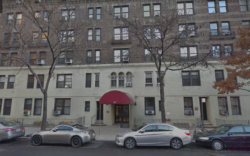
27 West 96th Street in Manhattan. Image Credit: Google Maps.
Landlord not responsible for more than four years of overcharged rent. On August 16, 2018, the Appellate Division for the First Department held that the landlord for 27 West 96th Street in Manhattan did not engage in a fraudulent scheme to evade the Rent Stabilization Law and therefore the New York State Division of Housing and Community Renewal (DHCR) had miscalculated the amount of overcharged rent that was due back to tenants.
The apartment building at 27 West 96th Street was subject to rent stabilization and during the 1999-2000 tax year, the landlord, Regina Metropolitan Co., LLC, also began receiving J-51 benefits until 2013. J-51 benefits are real estate tax breaks granted to landlords who make certain improvements to their building. Landlords cannot deregulate an apartment and charge market rents when receiving J-51 tax benefits.
In 2003, while still subject to J-51 benefits, the landlord set the rent for the apartments at the market rate rent of $4,500 after the prior tenant vacated the apartment. The tenants in this lawsuit moved to the apartment on August 1, 2005 with a monthly rent of $5,195.
In 2009, upon learning that the apartment was subject to rent-stabilization, tenants filed a complaint to determine the amount of rent overcharge that they were entitled to receive back from the landlord.
DHCR determined that the overcharge should be calculated as the difference between the market rate charged by landlord and the last legal regulated rent charged in the apartment. DHCR determined the last legal regulated rent was in 2003 for the sum of $2,096.47. Using this amount, DHCR determined that the base rent for the apartment should have been $3,325.24 and therefore the landlord overcharged the tenants by approximately $283,000, including interest.
The trial court affirmed DHCR’s determination that the tenants were overcharged but that the landlord did not engage in a fraudulent scheme, but rather misunderstood the implications of the J-51 program.
The Appellate Division, however, held that the rent stabilization law has a four-year limitations period from the time the complaint is filed to find the last regulated rent. In order to look beyond the four-year limitations period, there must be a showing of fraud or intentional wrongdoing by the landlord. The Appellate Division held that because DHCR determined that there was no fraudulent behavior by the landlord, using the rent amount from 2003 was beyond the four-year limitations period of when the complaint was filed in 2009.
The Appellate Division held that DHCR must recalculate the rent overcharge using the base date rent within the 4-year limitation period imposed by the rent stabilization law.
Matter of Regina Metro. Co., LLC v. New York State Div. of Hous. & Community Renewal, 2018 NY Slip Op 05797 (App. Div. Aug. 16, 2018).
By: Viktoriya Gray (Viktoriya is the CityLaw Fellow and NYLS Graduate, Class of 2018).

